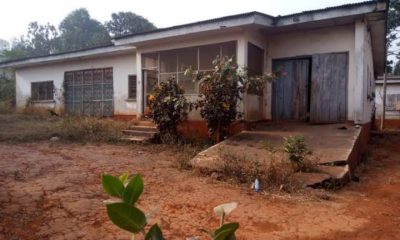news
RECOMMENDATIONS ON HOW TO AVOID BUILDING DEMOLITION IN LAGOS BY DENNIS ISONG

RECOMMENDATIONS ON HOW TO AVOID BUILDING DEMOLITION IN LAGOS BY DENNIS ISONG
Sahara Weekly Reports That The Lagos State Government reiterated its commitment to uniformly applying the law during the ongoing demolition of unauthorized structures in Lekki Phase II and the surrounding areas. One of the most awful events that can happen to anyone is investing millions in properties only to be demolished by the government later.
This begs the question of why the government waswatching while construction was going on and had to wait till it became something worthwhile before coming to destroy it. One thing we should understand is that, there are some marked up areas and the government knows what they are doing. Unfortunately, land sellers are duly aware but they try very hard to shield you from this information because of the money they hope to gain from its sales. If you are a victim, I sympathize with you. In order not to fall victim again, I will highlight the things you should watch out for.
Recommendations
1. Avoid land close to drainage canal:
Land near drainage canals is susceptible to flooding during heavy rains. Poor drainage systems can exacerbate this issue, leading to water damage to properties and posing a risk to the safety of inhabitants. Drainage canals can contribute to soil erosion, particularly during heavy rain events. This erosion can undermine the stability of buildings’ foundations, which was a factor in the demolition of some structures in Lagos. In many areas, there are regulations and building codes that prohibit construction too close to drainage canals due to the associated risks. Non-compliance can result in legal issues and property demolition, as observed in Lagos. Proximity to drainage canals can lead to safety concerns. In some cases, poor maintenance of these canals can result in accidents or structural damage. Real estate located close to drainage canals may have reduced property values due to the associated risks and inconveniences.
2. When getting building approval,also get drainage approval. In Lagos State, building approval and drainage approval are two distinct but interrelated processes that property developers and builders must go through when planning and constructing a new building or structure.
Building approval refers to the legal authorization granted by the Lagos State Government or relevant local authority to undertake construction or renovation of a building. It involves a thorough review of architectural plans, structural designs, and construction details to ensure they comply with building codes, safety standards, and zoning regulations. Building approval is crucial to ensure that structures are constructed safely, with proper planning, and in accordance with the law.
Drainage approval, on the other hand, pertains to the permission granted by the relevant authorities to manage the drainage and sewage systems associated with the building. It involves assessing how the building’s drainage, sewage, and wastewater systems will interact with the overall drainage infrastructure of the area. This approval is essential to prevent issues like flooding, erosion, and environmental contamination, which can result from inadequate drainage planning.
By obtaining both approvals in tandem, developers can help mitigate the risks associated with inadequate drainage, such as flooding and erosion, and ensure that their construction projects are both safe and environmentally responsible. It emphasizes the importance of comprehensive planning and compliance with local building and environmental regulations in Lagos State.
3. Follow the recommended setback “At Ikota, the level of encroachments is just unimaginable; people have built on the canal path and we resolved that these nuisances cannot be allowed to continue; it just had to stop,’’ Commissioner for the Environment and Water Resources, Tokunbo Wahab(culled from Premium Times).
Following the recommended setback is crucial when building in Lagos to avoid the risk of demolition and legal consequences.
A setback in building terms refers to the minimum required distance between a building or structure and a property boundary, road, or other buildings. Lagos, like many urban areas, has specific building regulations that stipulate these setbacks. Lagos has zoning and building codes that mandate setbacks for safety, aesthetics, and urban planning.
Failing to adhere to these regulations can lead to legal violations and demolition orders. Setbacks are often designed to ensure that buildings have adequate spacing between them, allowing for proper ventilation, fire safety, and emergency access.
Disregarding setbacks can compromise safety. Encroaching onto neighboring properties due to insufficient setbacks can lead to property disputes and legal actions, potentially resulting in building demolition to resolve boundary conflicts. In some cases, setbacks are established to protect public infrastructure like drainage systems. Failure to comply can disrupt these systems, causing flooding and further legal consequences.
4. Government should employ the right staff with the right attitude in all the control agencies related to building.
This emphasizes the importance of having qualified and motivated personnel in government agencies responsible for overseeing and regulating building-related activities. It underscores the need to hire individuals who have the necessary knowledge, education, and expertise in fields such as architecture, engineering, urban planning, and building inspection.
These professionals are essential for making informed decisions and assessments regarding building construction, safety, and compliance with regulations. Beyond qualifications, the right attitude is vital. Government employees working in control agencies related to building should be diligent, honest, and committed to their responsibilities.
They should prioritize the public interest, safety, and the enforcement of building codes and regulations.
Employing staff with the right attitude ensures that these agencies maintain a strong focus on quality control. It helps prevent corruption, negligence, and favoritism, which can compromise the safety and integrity of buildings.
The right staff can provide efficient oversight of construction projects, ensuring that they meet safety and environmental standards. This oversight is essential to prevent substandard construction, which can lead to disasters and costly corrections. When control agencies are staffed with qualified individuals who have the right attitude, it fosters public trust.
Citizens are more likely to have confidence in the government’s ability to regulate and enforce building standards effectively.
Dennis Isong is a TOP REALTOR IN LAGOS.He Helps Nigerians in Diaspora to Own
Property In Lagos Nigeria STRESS-FREE. For Questions WhatsApp/Call 2348164741041
news
Journalists for Good Governance Shines Searchlight on Local Government Administration

Journalists for Good Governance Shines Searchlight on Local Government Administration
…Calls for Accountability in Nigeria’s Grassroots Governance
LAGOS, Nigeria — A civil society coalition known as Journalists for Good Governance(JGG) has intensified public debate on transparency and accountability within Nigeria’s local government system, urging media professionals, civil society actors, and citizens to hold grassroots leaders accountable.
Speaking an event in Lagos recently, the acting chairman of the society, Comrade Bunmi Obarotimi said that despite reforms such as the Supreme Court’s 2024 ruling granting financial autonomy to all 774 Local Government Areas (LGAs), systemic challenges continues to hinder effective service delivery and responsible stewardship of public funds.
“Local governments are the closest tier of government to the people — yet too often they remain the least transparent. Without civic oversight and vibrant media, promises of autonomy ring hollow.” the acting chairman said.
The Journalist for Good Governance emphasised crucial roles that journalists can play in uncovering discrepancies in council spending, flagging poor service delivery, and educating citizens on their rights. Their call comes amid wider efforts by media and civic organisations to bridge accountability gaps. The civil society initiatives had previously launched monitoring campaigns to track local government expenditures and have been quietly advocating for transparency in how public money is deployed.
The leaders of the Journalists for Good Governance (JGG) highlighted the importance of physical assessment and citizens engagement on projects to boost people’s confidence, urging local councils to adopt open data platforms and proactive information dissemination in compliance with the Freedom of Information Act. Experts say the majority of LGAs currently lack operational websites or digital portals, further limiting public scrutiny.
The Journalists for Good Governance initiative aligns with sustained advocacy by civil society groups and governance experts calling for a collective approach to strengthening democratic accountability, and has decided to engage in critical and holistic assessments of how Local Governments is being run and the impact and quality of projects they embark-on and to address deficits in transparency and public trust.
Meanwhile, some state governments have signalled support for improved community engagement. In Lagos State, authorities reiterated a commitment to enhancing community media platforms as vehicles for civic participation and accountability at the grassroots level.
The renewed spotlight on local government administration has reignited public debate over fiscal responsibility and priorities. Controversies such as the widely criticised Adamawa council chairmen’s wives trip to Istanbul — which drew public outrage for perceived misuse of public funds — underscore why watchdog groups say stronger oversight mechanisms are urgently needed at the grassroots.
Citizens and activists have welcomed the journalists’ initiative, calling for sustained media engagement that goes beyond headlines to influence policy and accountability reform.
The civic rights advocates note that real change will require robust legal frameworks, a free press, and empowered communities equipped to demand transparency at every level of governance.
As Journalists for Good Governance mobilises its members, the coming months are likely to see heightened media attention on grassroots administration — from council budgets and service delivery to the enforcement of public information laws and digital transparency initiatives.
news
ANOTHER PROPHECY FULFILLMENT BY PROPHET KINGSLEY AITAFO OVER THE EXIT OF DR. KENOLY, ANNOUNCING FEBRUARY’S OPEN PROPHETIC REVIVAL

ANOTHER PROPHECY FULFILLMENT BY PROPHET KINGSLEY AITAFO OVER THE EXIT OF DR. KENOLY, ANNOUNCING FEBRUARY’S OPEN PROPHETIC REVIVAL
– Another Prophecy Fulfillment by Prophet Kingsley Aitafo Following the Passing of Ron Kenoly Ahead of February Open Prophetic Revival
– Prophet Kingsley Aitafo Records Another Prophecy Fulfillment as February Open Prophetic Revival Is Announced
In the released prophecies for 2026, renowned Nigerian cleric, Prophet Kingsley Aitafo, shared a series of revelations touching on Nigeria’s economy, global events, political transitions, natural disasters, religious transformations, and the future of world leaders.
During a special prophetic session, the prophet stated that he foresaw the departure of two world-renowned musicians in 2026 and urged the Nigerian people and the global community to pray for them.
He urged Nigerians and everyone around the globe to pray for the musicians, among other prophecies, and already gave insight concerning them.
On February 3, 2026, American gospel singer, songwriter, and worship leader Ron Kenoly passed away at the age of 81. Widely known as the “Professor of Praise,” Kenoly was celebrated for anthems such as “Majesty” and “Lift Him Up,” which have significantly influenced modern congregational worship around the world.
He was recognized as a pioneer of the contemporary praise and worship movement, leading Scripture-based worship services that became widely adopted in churches across different nations and cultures.
The development has been described by followers of Prophet Kingsley Aitafo as a confirmation of the prophecy earlier declared in the year.
Meanwhile, Prophet Kingsley Aitafo, leader and shepherd in charge of Oneness in Christ, in conjunction with CCC Living Grace Tabernacle, invites everyone to its February Open Revival. It is a prophetic service determined to change lives through miracles, healings, signs, and wonders.
It is not an ordinary service; it is another time for a divine encounter where your faith is strengthened, prayers are answered, and breakthroughs and favour are about to rain. With its theme — Jesus Christ is the same forever — the revival is promised to release the power of Jesus Christ like never before. It is a period of shift and divine encounter.
This revival service is said to hold on the 25th of February, 2026, from 5pm – 8pm at 20, Showole Street, Ewupe, Singer Sango, Ogun State.
It is a season where God is ready to reveal Himself like never before. Members of the public are invited to attend.
news
GEN CHRISTOPHER GWABIN MUSA SUPPORT INITIATIVE COMMENDS STATE-FEDERAL COLLABORATION IN ZAMFARA

GEN CHRISTOPHER GWABIN MUSA SUPPORT INITIATIVE COMMENDS STATE-FEDERAL COLLABORATION IN ZAMFARA
The Gen Christopher Gwabin Musa Support Initiative (GCGMSI) has commended the Zamfara State Government for its decisive contribution to security operations through the donation of newly acquired armoured personnel carriers (APCs), surveillance drones, and other critical operational equipment to troops and security agencies in the state.
This commendation was contained in a statement signed by the Convener of the GCGMSI, Ibrahim Dahiru Danfulani, Sadaukin Garkuwan Keffi/Betara Biu, and made available to the press.
The equipment was formally commissioned on Wednesday, February 18, by the Grand Patron of the GCGMSI and Minister of Defence, General Christopher Gwabin Musa, OFR (rtd.), in a ceremony at the Government House, Gusau. The event was attended by senior military officers, heads of security agencies, and top officials of the Zamfara State Government.
The GCGMSI, in its statement, hailed the donation as a “transformative and timely intervention” that aligns perfectly with its core objective of advocating for and supporting tangible measures that enhance the operational capacity and welfare of Nigeria’s security forces. The Initiative praised Governor Dauda Lawal’s administration for moving beyond rhetoric to actionable, material support, describing the move as a “blueprint for state-level collaboration in national security.”
“The provision of these assets by the Zamfara State Government is a testament to visionary leadership and a profound commitment to the peace and stability of its people,” the GCGMSI statement read. “It represents the exact kind of synergistic partnership between state and federal authorities that the GCGMSI champions. This initiative will significantly close operational gaps, boost the confidence of our gallant troops, and send a strong message to criminal elements.”
Speaking at the commissioning, General Musa emphasized that sustained collaboration is indispensable in confronting the nation’s evolving security challenges. He specifically commended Governor Lawal for his proactive support.
“Governor Dauda Lawal has demonstrated exemplary leadership and an unwavering dedication to the security of Zamfara State,” the Defence Minister stated. “The provision of these armoured vehicles, surveillance drones, and other operational equipment will undoubtedly boost the morale and operational effectiveness of our troops and other security agencies on the ground. This is a commendable effort that should be emulated by others.”
The newly commissioned assets, which include multiple APCs and advanced surveillance drones, are expected to dramatically enhance the mobility, protection, intelligence-gathering, and rapid response capabilities of security forces, particularly in the state’s remote and difficult terrains where anti-banditry operations are ongoing.
In his remarks, Governor Lawal reiterated his administration’s steadfast commitment to being a reliable partner in the security architecture. He urged security agencies to deploy the new resources responsibly and effectively to safeguard lives and property.
The Federal Government, through the Ministry of Defence, reaffirmed its commitment to continuing and deepening such partnerships with state governments across the nation to strengthen coordination and resource allocation in the collective fight against insecurity.
The GCGMSI concluded its statement by urging other state governments to take a cue from Zamfara’s “bold and pragmatic” approach, affirming that such concrete support is vital for achieving lasting peace and security across Nigeria.
-

 celebrity radar - gossips6 months ago
celebrity radar - gossips6 months agoWhy Babangida’s Hilltop Home Became Nigeria’s Political “Mecca”
-

 society6 months ago
society6 months agoPower is a Loan, Not a Possession: The Sacred Duty of Planting People
-

 society5 months ago
society5 months agoReligion: Africa’s Oldest Weapon of Enslavement and the Forgotten Truth
-

 news6 months ago
news6 months agoTHE APPOINTMENT OF WASIU AYINDE BY THE FEDERAL GOVERNMENT AS AN AMBASSADOR SOUNDS EMBARRASSING










